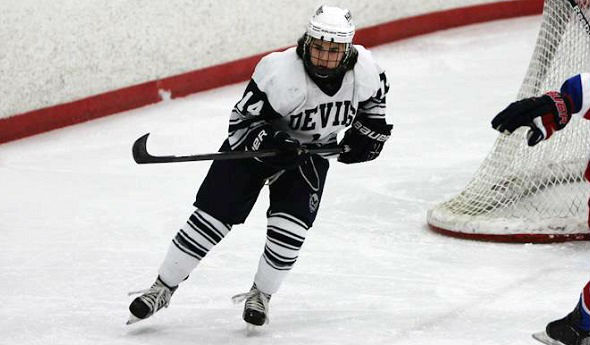
Roque Shines as Sault Ste Marie Surges
January 14, 2016
By Dennis Grall
Special for Second Half
SAULT STE. MARIE – Abby Roque has taken a somewhat unusual route to reach another high level of hockey.
 The Sault Ste. Marie High School senior, an accomplished international player on the women's side, is the only female playing on her school's boys hockey team, as she’s been each of her four seasons with the Blue Devils. She is the only girl to have ever played for the Sault, which is home to one of the top boys programs in the state.
The Sault Ste. Marie High School senior, an accomplished international player on the women's side, is the only female playing on her school's boys hockey team, as she’s been each of her four seasons with the Blue Devils. She is the only girl to have ever played for the Sault, which is home to one of the top boys programs in the state.
The Blue Devils, two-time MHSAA champions who finished second in the Division 3 playoffs in 2013 and 2014 and reached the Quarterfinals last year, are 10-4-1 this winter.
Roque, a forward who also plays on the team's top power play unit, has five goals and 14 assists. She has received a scholarship to play for the University of Wisconsin, which has one of the nation's premier women's hockey programs. The Badgers, coached by former Olympian and NHL star Mark Johnson, are currently ranked second in the country.
"It has really helped me see how college hockey will be," Roque said before a recent practice as the Blue Devils prepared for the Sault Lions Showcase this weekend and games against Dearborn Divine Child and Bloomfield Hills Brother Rice. Sault Ste. Marie is ranked No. 9 in Division 3 this week.
"It's been a good four years. It has helped me improve every single year," she added. "I've never been the best player on the team, but that has made me work hard to try to be the best player on the team.”
Last season, Roque was one of 15 girls who played on boys high school hockey teams in Michigan and earned Division 3 all-state second team honors.
She also played on the U.S. Women's Under-18 International Ice Hockey Federation world championship team that won gold in 2015.
"The speed of the guys high school game has helped me prepare for women's college hockey," she said.
While not as fast on the high school ice, Roque knows how to compensate against the boys. Asked for her primary strength, she said, "my smarts on the ice. The guys are very fast, they are very powerful. I have to make the right pass. My stick handling skills are good."
Those skills also give her a decided edge when she does play against other females, such as the IIHF world tourney, where she led the world juniors in face-offs. Even though checking is not allowed in the girls game, her experience in the more physical brand of boys hockey has helped provide a major advantage.
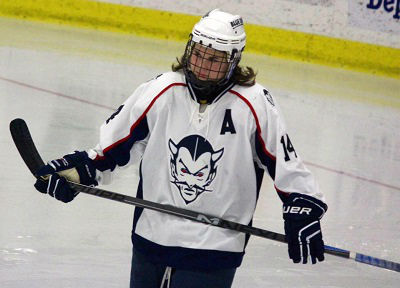 "I do enjoy the checking. The physical part of hockey is great," she said with a chuckle. "Girls hold the puck longer. Guys come at you (faster and harder) and you have to move the puck faster."
"I do enjoy the checking. The physical part of hockey is great," she said with a chuckle. "Girls hold the puck longer. Guys come at you (faster and harder) and you have to move the puck faster."
Getting knocked around in the corner in boys games is no problem. "I'm not intimidated by anyone on the ice," she said. "I've gotten stronger playing with the guys. I'm clearly not as strong, but I hold my own. It is all really just hockey to me at this point."
Her Sault coach, John Ferroni, said many opposing players and fans are not even aware there is a female on the ice. "She has definitely learned how to manage herself in the boys game," he said. "She is very competitive, sometimes even too competitive."
Indeed, she says, "I try to be the intimidating one on the ice."
That is not surprising since she has grown up with hockey a major part of her life. She began playing at age 4 and her father, Jim, is a former hockey coach at Lake Superior State University. Her uncle, Tom Bissett, is hockey coach at Grand Rapids Forest Hills Northern.
"If kids inherit things from their parents, she has inherited her dad's hockey IQ. She picked up the sport and has had a lot of hockey conversations with her father, and she comes from a hockey family," Ferroni said, noting her mother also has a strong athletic background.
Roque, who also has played golf and soccer and boasts 4.0 grade-point average taking advanced placement classes, said playing boys hockey was not a hard decision. She played in the strong Sault boys youth program from day one and realized the boys were the direction to take after playing girls hockey in the fall as an eighth grader.
"She always played with good hockey players, and they always accepted her as a girl," said Ferroni, in his fifth year as Sault coach. He said Roque "understands the game real well and made the commitment a long time ago. She is very dedicated to the sport."
Ferroni said Roque "has decent speed and decent quickness at the boys level. She is a strong skater and is very hard to knock off the puck. She is very elusive and always seems aware of what is going on around her."
That ability to see the game makes her "a playmaker without question" according to Ferroni. "She passes the puck extremely well; she has good, strong passing skills."
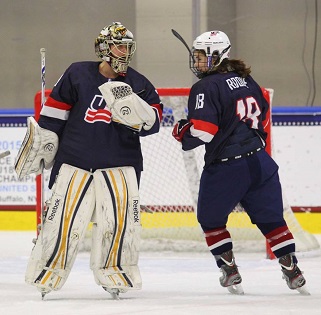 Ferroni admits he "had to look at a lot of things before taking her" on the team. After that process concluded, he said, "I knew she would be fine, but no way did I think she would rise to the level she has risen to. I didn't see that (second team all-state) coming."
Ferroni admits he "had to look at a lot of things before taking her" on the team. After that process concluded, he said, "I knew she would be fine, but no way did I think she would rise to the level she has risen to. I didn't see that (second team all-state) coming."
After checking out girls programs, Roque and Ferroni realized the Sault High School boys team would be the best path to follow. Ferroni said playing against other girls was not fast enough, and the puck movement among the boys was much better.
"We afforded her and gave her a great opportunity," Ferroni said. "She walked into a good, strong program as a freshman and was not just being a player, but was a real solid player. She definitely has raised the bar around here for girls.
"She has helped us as much as we have helped her."
Roque said Wisconsin "was the right fit for me. I loved everything about it, about Madison. Everything is about hockey. I just couldn't go anywhere else."
Roque also received scholarship offers from women's programs at North Dakota, Boston College and Boston University, among other schools.
This school year's participation figures will not be compiled until the spring, but about 250 girls total played on MHSAA boys teams in 2014-15.
 Denny Grall retired in 2012 after 39 years at the Escanaba Daily Press and four at the Green Bay Press-Gazette, plus 15 months for WLST radio in Escanaba; he served as the Daily Press sports editor from 1970-80 and again from 1984-2012. Grall was inducted into the Upper Peninsula Sports Hall of Fame in 2002 and serves as its executive secretary. E-mail him at [email protected] with story ideas for the Upper Peninsula.
Denny Grall retired in 2012 after 39 years at the Escanaba Daily Press and four at the Green Bay Press-Gazette, plus 15 months for WLST radio in Escanaba; he served as the Daily Press sports editor from 1970-80 and again from 1984-2012. Grall was inducted into the Upper Peninsula Sports Hall of Fame in 2002 and serves as its executive secretary. E-mail him at [email protected] with story ideas for the Upper Peninsula.
PHOTOS: (Top) Sault Ste. Marie's Abby Roque positions herself near the net during one of her team's games. (Middle) Roque is the first girl to play on the Sault's boys hockey team. (Below) Roque, here on her U.S. Under-18 team, brings international experience to the high school season. (Photos courtesy of the Sault Ste. Marie athletic department.)
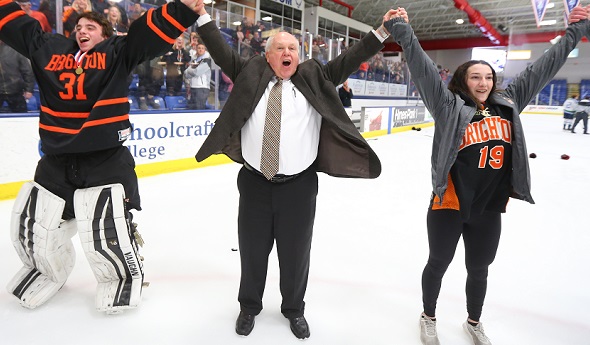
Brighton Coach's Impact 'Immeasurable'
By
Tim Robinson
Special for MHSAA.com
October 7, 2020
By Tim Robinson
Special for Second Half
Paul Moggach has never been much for looking back.
 And as he begins his first season away from the Brighton hockey program in more than three decades, he’s still looking ahead.
And as he begins his first season away from the Brighton hockey program in more than three decades, he’s still looking ahead.
“I’m thinking about what I’m going to miss more than the mark I left,” he said in a phone conversation last week. “I guess I enjoyed so much of the time I had, the opportunity to coach at Brighton, I’m thinking more how I fill the time and the things I'll miss.”
Moggach (pronounced MUG-uth) retired as Brighton’s coach this past summer after 25 seasons and having led five teams to MHSAA Division 1 championships. He compiled a record of 466-172-47 during that period.
But that’s not what he remembers most, nor why he wants people to remember him.
“I would like them to remember the teams and players who played for me and my assistants, more than me,” Moggach said. “We have so many blessings and opportunities in our lives, and hockey was one for me and hopefully for the players and assistants I worked with.”
One of those assistants was Kurt Kivisto, who joined the Bulldogs originally as a team manager more than 20 years ago and was a player at Brighton. He eventually won a national championship at Michigan State before rejoining the program as an assistant coach a decade ago.
“The No. 1 thing I’ll take from him is sticking by your beliefs and not sacrificing those beliefs for the team,” said Kivisto, who was named Moggach’s successor in September. “He sticks by those beliefs and ... he’s not willing to sacrifice that even if it could hurt the team. The character and integrity he has, how he treats people with fairness and what he believes is right is the biggest thing I’ll take.”
A stepson, Damon Whitten, played for Moggach at Brighton and at MSU before becoming an assistant coach and eventually the head coach at Lake Superior State, where he is in his eighth season.
Asked about Moggach’s impact at Brighton, Whitten said, “I’m not sure you can measure it. Your mind goes to the hockey players who have come to Brighton, and that’s a big part. But I think it goes beyond that. The money they’ve raised over the years for different families in need, for example. He’s had a big impact, and the players he had were a big part of that, but it goes well beyond that, and he did it the right way. Thirty-plus years (in the program), and I’m not sure you can count more than a handful of times where he made a bad decision or handled things poorly. He did things the right way, every day, all of the time, and I think it’s why he was so successful for so long.”
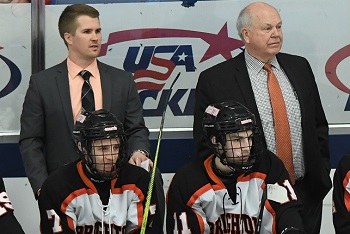 The team’s charitable works were mostly kept under the radar – Moggach’s reasoning being his players had been given much, it was their turn to give back, and he didn’t want people thinking they did those things for publicity.
The team’s charitable works were mostly kept under the radar – Moggach’s reasoning being his players had been given much, it was their turn to give back, and he didn’t want people thinking they did those things for publicity.
Moggach joined Rick Bourbonais as an assistant at Brighton in the mid-1980s, then switched roles with him for the 1996-97 season.
He realized Brighton’s potential in the 1992-93 season, when the Bulldogs upset perennial state power Trenton in the Class A Quarterfinals before losing to Detroit Catholic Central in a Semifinal.
“That, to me, said, at least in my mind, that we can do this,” Moggach said. “It’s not impossible.”
He slowly began to build the program, getting good players and a schedule that would challenge them.
“You get the players by building a good culture,” he said. “Back in the day, when I started, we weren’t very disciplined and our league wasn’t very disciplined. So I think we realized we had to build that, and I could have an influence on building that in Brighton.”
Along with the culture, Moggach looked for an edge whenever he could find it. He was talked into making a trip to the Keweenaw Peninsula by one of his player’s parents, and found enormous benefits for his team, both competitively and in team bonding.
“It’s a lot about the little things we do,” he said, “that we find joy in, and create those opportunities. Creating the little moments really can build to bigger moments. We played capture the flag one day in about two feet of snow.
“Almost killed them,” he added, chuckling. The exhausted players didn’t have much left for the game that night, but spending time together for four days in a bus and hotel room always brought the team closer on and off the ice.
That first UP expedition also led to more teams making the trip, for team bonding and a glimpse of a part of the state, and themselves, they might never have seen otherwise.
“We didn’t do that for long,” he said. “But we always came back saying we were better together because of that experience.”
Bob Nelson had three sons play for Moggach, and Nelson’s wife, Kris, was president of the team’s booster club during their involvement over nearly a decade in Brighton hockey. Nelson also coached the program’s younger players for five seasons.
“We got to know the Moggachs really well,” he said. “It was a good experience, both as a coach and as a parent as well.”
Moggach introduced other things, including an emphasis on nutrition and off-ice training, that players resisted at first until they saw the benefits.
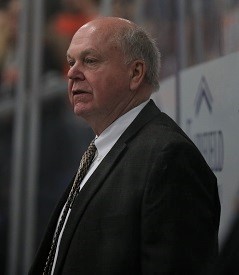 He savored conversations with referees and opposing coaches before the games and even the occasional reporter after games.
He savored conversations with referees and opposing coaches before the games and even the occasional reporter after games.
But his first priority was the players. At times he would erupt in practice at a player or, more commonly, the team, and the boys soon learned to hear the message, not the volume. But for a couple of seasons, they also wrote some of his wilder statements down in a notebook after practice.
One year, they read some of them at the banquet, and after each one, Moggach’s wife, Sharon, would look at him and ask, “Did you really say that?”
Moggach would laugh and confess to remembering he had actually done so, then laughing.
“He knew part of what made the program good was his relationship to the players,” Nelson said. “If it was a good time, he wanted to enjoy it, even at his own expense at times.”
Moggach has staying in the background this offseason, letting Kivisto shape the team.
Asked if he were willing to fully switch coaching roles, as he and Bourbonais did a quarter-century ago, Moggach laughed.
“No,” he said emphatically. “Rick wasn’t in his 70s when we made the switch. Kurt needs his time. I’ll be there if he needs me.”
Moggach, who is 74, still works fulltime as the University of Michigan’s director of risk management.
He plans to spend more time with his wife and watch his grandsons play hockey, as well as catching some Lake Superior State games.
“I was really blessed to have Rick and Brownie (longtime assistant Mike Brown) along for the ride, and then to get Kurt involved,” Moggach said. “They weren’t the only ones, but they were the kids for me.
“The other thing is the support from the Brighton (High School) administration, the teachers, and our community. There are more people to thank than I could ever bring up. I do think that, all together, it was a great run. It couldn’t have been any better.”
PHOTOS: (Top) Recently-retired Brighton hockey coach Paul Moggach celebrates the 2018 Division 1 championship game win over Saginaw Heritage at USA Hockey Arena. (Middle) Former player Kurt Kivisto, left of Moggach during the 2018 Semifinal win over Detroit Catholic Central, served as an assistant before assuming the head coaching job in September. (Below) Brighton's 2018 championship was its fifth under Moggach. (Photos by Hockey Weekly Action Photos.)

